11 start with S start with S
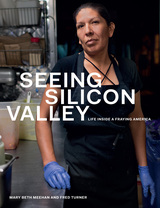
It’s hard to imagine a place more central to American mythology today than Silicon Valley. To outsiders, the region glitters with the promise of extraordinary wealth and innovation. But behind this image lies another Silicon Valley, one segregated by race, class, and nationality in complex and contradictory ways. Its beautiful landscape lies atop underground streams of pollutants left behind by decades of technological innovation, and while its billionaires live in compounds, surrounded by redwood trees and security fences, its service workers live in their cars.
With arresting photography and intimate stories, Seeing Silicon Valley makes this hidden world visible. Instead of young entrepreneurs striving for efficiency in minimalist corporate campuses, we see portraits of struggle—families displaced by an impossible real estate market, workers striving for a living wage, and communities harmed by environmental degradation. If the fate of Silicon Valley is the fate of America—as so many of its boosters claim—then this book gives us an unvarnished look into the future.


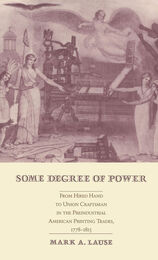

Still Life offers a fascinating and detailed ethnographic account of what it takes to prevent these disasters from happening. Going behind the scenes at MoMA, Domínguez Rubio provides a rare view of the vast technological apparatus—from climatic infrastructures and storage facilities, to conservation labs and machine rooms—and teams of workers—from conservators and engineers to guards and couriers—who fight to hold artworks still.
As MoMA reopens after a massive expansion and rearranging of its space and collections, Still Life not only offers a much-needed account of the spaces, actors, and forms of labor traditionally left out of the main narratives of art, but it also offers a timely meditation on how far we, as a society, are willing to go to keep the things we value from disappearing into oblivion.
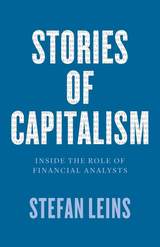
Building on recent developments in the social studies of finance, Stories of Capitalism provides the first ethnography of financial analysis. Drawing on two years of fieldwork in a Swiss bank, Stefan Leins argues that financial analysts construct stories of possible economic futures, presenting them as coherent and grounded in expert research and analysis. In so doing, they establish a role for themselves—not necessarily by laying bare empirically verifiable trends but rather by presenting the market as something that makes sense and is worth investing in. Stories of Capitalism is a nuanced look at how banks continue to boost investment—even in unstable markets—and a rare insider’s look into the often opaque financial practices that shape the global economy.
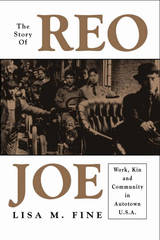
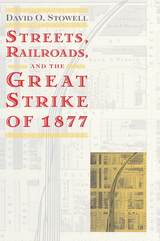
Whereas most historians treat the event solely as a massive labor strike that targeted the railroads, David O. Stowell examines America's predicament more broadly to uncover the roots of this rebellion. He studies the urban origins of the Strike in three upstate New York cities—Buffalo, Albany, and Syracuse. He finds that locomotives rumbled through crowded urban spaces, sending panicked horses and their wagons careening through streets. Hundreds of people were killed and injured with appalling regularity. The trains also disrupted street traffic and obstructed certain forms of commerce. For these reasons, Stowell argues, The Great Strike was not simply an uprising fueled by disgruntled workers. Rather, it was a grave reflection of one of the most direct and damaging ways many people experienced the Industrial Revolution.
"Through meticulously crafted case studies . . . the author advances the thesis that the strike had urban roots, that in substantial part it represented a community uprising. . . .A particular strength of the book is Stowell's description of the horrendous accidents, the toll in human life, and the continual disruption of craft, business, and ordinary movement engendered by building railroads into the heart of cities."—Charles N. Glaab, American Historical Review
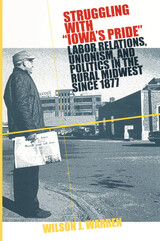
Recognized between 1880 and 1910 by its trademark label "Iowa's Pride," John Morrell and Company is best known for contributing one of the most important local unions to the progressive United Packinghouse Workers of America. During the 1930s and 1940s, its members pursued a militant brand of unionism. By the early 1950s, the local's militancy became a source of contention among the membership. By explaining the effect of Morrell-Ottumwa's union leaders on local and state Democratic politics, especially in the development of the Congress of Industrial Organizations' Iowa State Industrial Union Council and the AFL-CIO's Iowa Federation of Labor, Wilson Warren makes an important contribution to the literature on labor's involvement in the Democratic party's ascendancy across much of the industrial North following World War II.
This history of Ottumwa's meatpacking workers provides insights into the development of several forms of labor relations, including the evangelical Christian paternalism, welfare capitalism, and unionism that were distinctive to one blue-collar community but that also reflected workers' experiences in many other rural midwestern industrial communities. By carefully analyzing all relevant labor and industrial sources and by revealing the deeply held aspirations and concerns expressed by both workers and managers, Warren constructs a window through which Iowa's industrial and labor history over the past 120 years can be viewed.
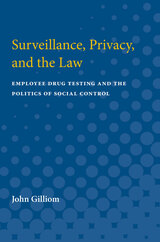
Drawing on theories of ideological hegemony and legal mobilization, John Gilliom begins the search for answers with an examination of how the imagery of a national drug crisis served as the legitimating context for the introduction of testing. Surveillance, Privacy, and the Law then moves beyond the specific history of testing and frames the new policy within a broader transformation of social control policy seen by students of political economy, society, and culture. The book cites survey research among skilled workers and analyzes court opinions to highlight the sharply polarized opinions in the workplaces and courthouses of America. Although federal court decisions show massive and impassioned disagreement among judges, the new conservative Supreme Court comes down squarely behind testing. Its ruling embraces surveillance technology, rejects arguments against testing, and undermines future opposition to policies of general surveillance.
Surveillance, Privacy, and the Law portrays the apparent triumph of testing policies as a victory for the conservative law-and-order movement and a stark loss for the values of privacy and autonomy. As one episode in a broader move toward a surveillance society, the battle over employee drug testing raises disturbing questions about future struggles over revolutionary new means of surveillance and control.
John Gilliom is Professor of Political Science, Ohio University.
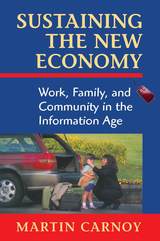
This book explores the growing tension between the requirements of employers for a flexible work force and the ability of parents and communities to nurture their children and provide for their health, welfare, and education. Global competition and the spread of information technology are forcing businesses to engage in rapid, worldwide production changes, customized marketing, and just-in-time delivery. They are reorganizing work around decentralized management, work differentiation, and short-term and part-time employment. Increasingly, workers must be able to move across firms and even across types of work, as jobs get redefined.
But there is a stiff price being paid for this labor market flexibility. It separates workers from the social institutions—family, long-term jobs, and stable communities—that sustained economic expansions in the past and supported the growth and development of the next generation. This is exacerbated by the continuing movement of women into paid work, which puts a greater strain on the family's ability to care for and rear children. Unless government fosters the development of new, integrative institutions to support the new world of work, the author argues, the conditions required for long-term economic growth and social stability will be threatened. He concludes by laying out a framework for creating such institutions.
READERS
Browse our collection.
PUBLISHERS
See BiblioVault's publisher services.
STUDENT SERVICES
Files for college accessibility offices.
UChicago Accessibility Resources
home | accessibility | search | about | contact us
BiblioVault ® 2001 - 2024
The University of Chicago Press









